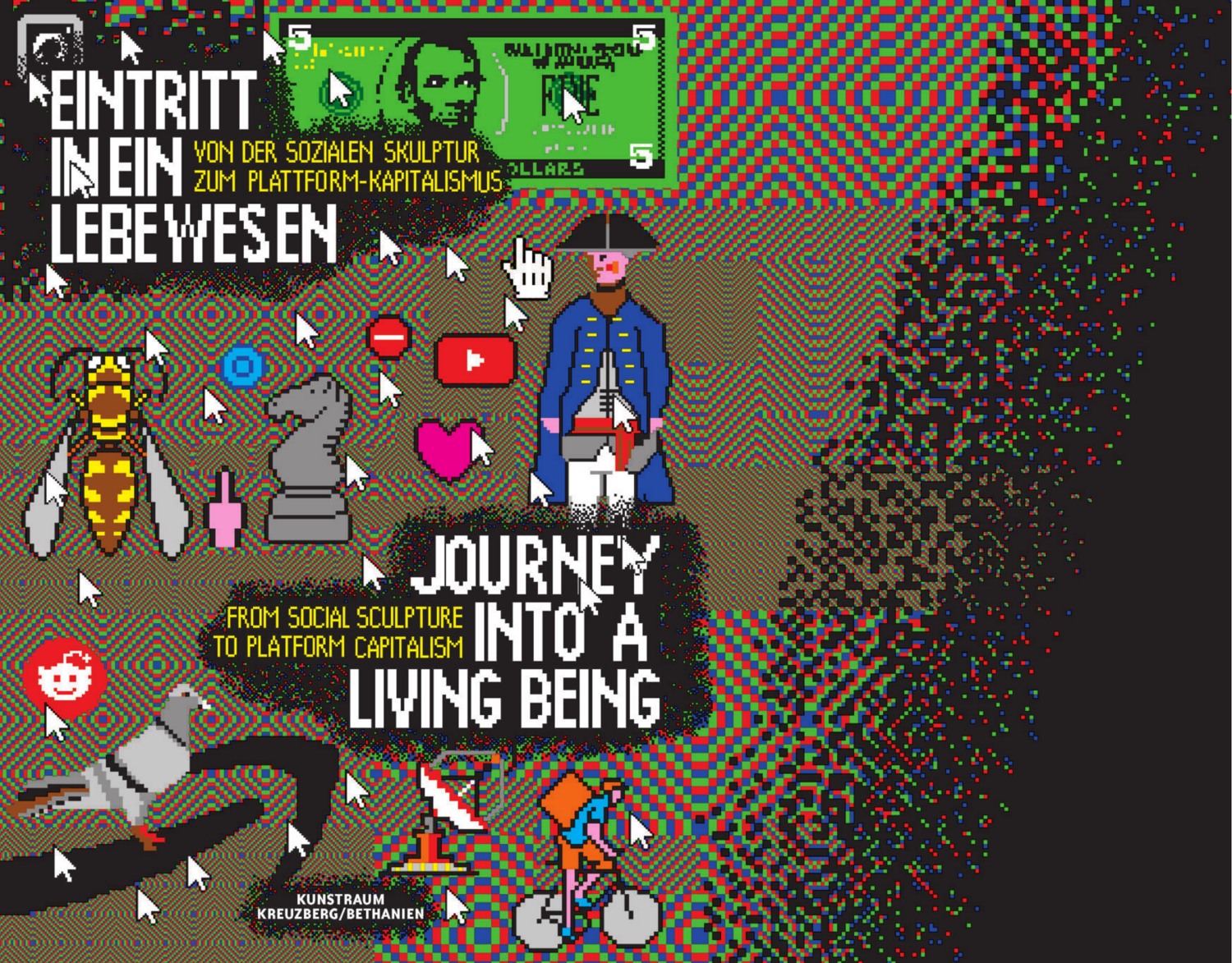Eintritt in ein Lebewesen. Von der sozialen Skulptur zum Plattform-Kapitalismus / Journey Into a Living Being: From Social Sculpture to Platform Capitalism (2020) [German/English]
Filed under catalogue | Tags: · art, capitalism, data, internet, platform, privacy, social media, surveillance

“In 1977, Joseph Beuys presented his installation Honey Machine at the Workplace at documenta 6, in which tubes ran into the exhibition rooms, through which honey was pumped. The work symbolized Beuys’ idea of the expanded concept of art and of social sculpture. “Everyone is an artist” is his famous motto –not because everyone can paint, dance or make music, but because we all contribute through our productivity to a collective creativity that can be weighed as real capital and societal potential, to which Beuys ascribed the formula “art = capital.” Honey as the “spiritual nutrition of the cosmos” (Beuys) is the embodiment of this collective creativity.
These days, we deliver our creative “honey” voluntarily to internet companies like Google, Facebook, Twitter, TikTok or Amazon. Computers and smartphones, online speakers and fitness wristbands upload a large portion of our data to these companies’ servers. Even rental bikes and e-scooters collect our location data. Our every click, every Like, every photo posted and every online comment is fuel for the companies of “surveillance capitalism” (Shoshana Zuboff). They use our data to sell advertising, predict our behavior, optimize their algorithms and AI, and to keep competing companies out of the market as much as possible.
The exhibition Journey Into a Living Being takes its name from a lecture Beuys gave on social sculpture at documenta. It traces the conceptual trajectory to the present, in which the internet and social media are replete with offers of creative services, but where only few reap the financial rewards. It brings together artworks spanning forty years with the aim of deciphering what has come to pass between the development of social sculpture and the rise of platform capitalism and the gig economy, and how this process is reflected in art.”
Edited by Tilman Baumgärtel
Publisher Kunstraum Kreuzberg/Bethanien, Berlin, 2020
ISBN 9783000652608, 3000652604
111 pages
Exhibition (18.5-16.8.2020)
WorldCat
PDF (6 MB)
Comment (0)Addie Wagenknecht, et al.: Deep Lab (2014)
Filed under book | Tags: · art, cyberfeminism, digital culture, feminism, internet, media infrastructure, privacy, security, surveillance, technology, web

“Deep Lab book is a compilation of reflections on digital culture, the post-Snowden Internet, and cyberfeminism. Created in five days by a dozen women, it represents the capstone to Deep Lab, a congress of cyberfeminist researchers, organized by Frank-Ratchye STUDIO Fellow Addie Wagenknecht to examine how the themes of privacy, security, surveillance, anonymity, and large-scale data aggregation are problematized in the arts, culture and society.
During the second week of December 2014, the Deep Lab participants—a group of internationally acclaimed new-media artists, information designers, data scientists, software engineers, hackers, writers, journalists and theoreticians—gathered to engage in critical assessments of contemporary digital culture. They worked collaboratively at the STUDIO in an accelerated pressure project, blending aspects of a booksprint, hackathon, dugnad, charrette, and a micro-conference. The outcomes of this effort include the visualizations, software, reflections and manifestos compiled in this book; an album of ten lecture presentations, the Deep Lab Lecture Series; and a documentary film featuring interviews with the Deep Lab participants.”
By Addie Wagenknecht, Allison Burtch, Claire L. Evans, Denise Caruso, Harlo Holmes, Ingrid Burrington, Jillian C. York, Jen Lowe, Kate Crawford, Lindsay Howard, Lorrie Faith Cranor & CUPS, Maddy Varner, Maral Pourkazemi, and Runa A. Sandvik.
Publisher Deep Lab and Frank-Ratchye STUDIO for Creative Inquiry at Carnegie Mellon University, Dec 2014
Creative Commons BY-NC-SA 4.0 License
ISBN 978-1-312-77551-0
234 pages
PDF, PDF (109 MB, updated on 2018-4-14)
Deep Lab Lectures Series (10 videos, Dec 2014)
Documentary (18 min)
Heidi Boghosian: Spying on Democracy: Government Surveillance, Corporate Power, and Public Resistance (2013)
Filed under book | Tags: · democracy, freedom, intelligence agency, internet, law, privacy, surveillance

“Until the watershed leak of top-secret documents by Edward Snowden to the Guardian UK and the Washington Post, most Americans did not realize the extent to which our government is actively acquiring personal information from telecommunications companies and other corporations. As made startlingly clear, the National Security Agency (NSA) has collected information on every phone call Americans have made over the past seven years. In that same time, the NSA and the FBI have gained the ability to access emails, photos, audio and video chats, and additional content from Google, Facebook, Yahoo, Microsoft, YouTube, Skype, Apple, and others, allegedly in order to track foreign targets.
In Spying on Democracy, National Lawyers Guild Executive Director Heidi Boghosian documents the disturbing increase in surveillance of ordinary citizens and the danger it poses to our privacy, our civil liberties, and to the future of democracy itself. Boghosian reveals how technology is being used to categorize and monitor people based on their associations, their movements, their purchases, and their perceived political beliefs. She shows how corporations and government intelligence agencies mine data from sources as diverse as surveillance cameras and unmanned drones to iris scans and medical records, while combing websites, email, phone records and social media for resale to third parties, including U.S. intelligence agencies.
The ACLU’s Michael German says of the examples shown in Boghosian’s book, “this unrestrained spying is inevitably used to suppress the most essential tools of democracy: the press, political activists, civil rights advocates and conscientious insiders who blow the whistle on corporate malfeasance and government abuse.” Boghosian adds, “If the trend is permitted to continue, we will soon live in a society where nothing is confidential, no information is really secure, and our civil liberties are under constant surveillance and control.” Spying on Democracy is a timely, invaluable, and accessible primer for anyone concerned with protecting privacy, freedom, and the U.S. Constitution.”
Foreword by Lewis Lapham
Publisher City Lights, San Francisco, 2013
Open Media series
ISBN 0872865991, 9780872865990
352 pages

